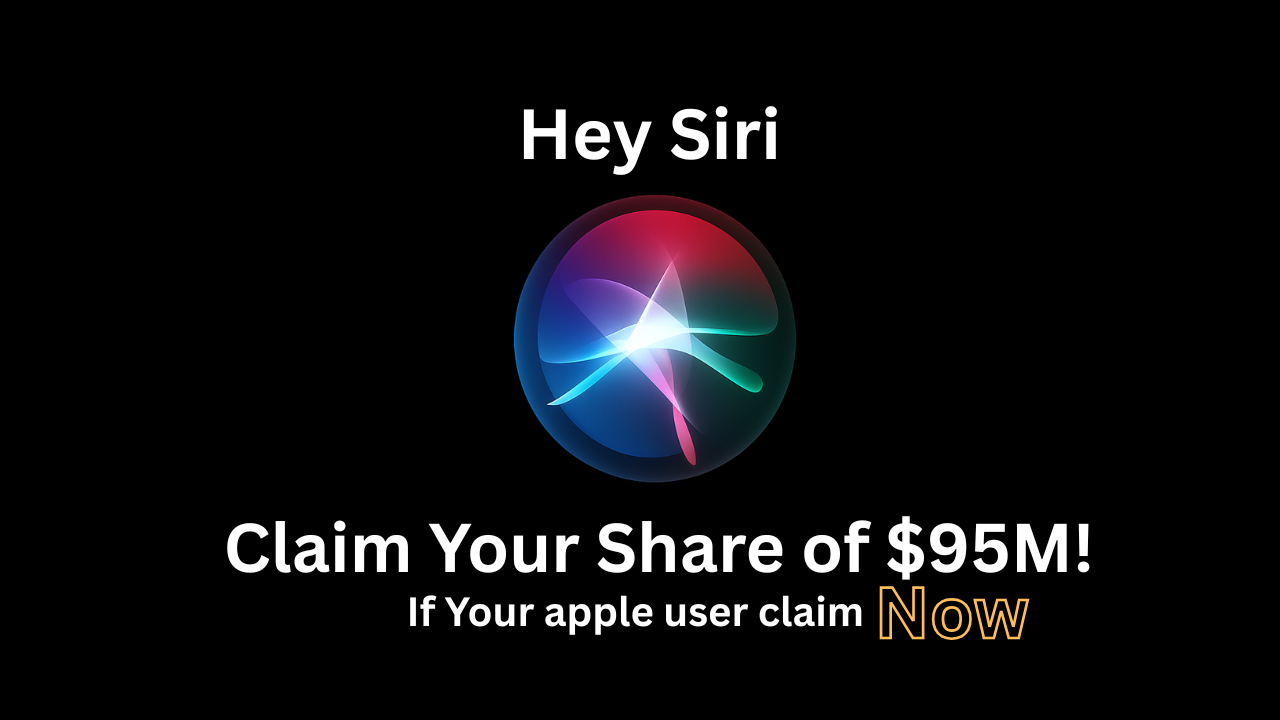If you’ve ever owned an iPhone, iPad, MacBook, or any Siri-enabled Apple device since 2014, you may be entitled to a portion of a $95 million settlement. The class action lawsuit, Lopez v. Apple, alleges that Apple’s voice assistant, Siri, may have accidentally recorded private conversations — and now, affected users can claim compensation. Here’s everything you need to know to check if you qualify, how to file a claim, and what this means for your rights as a consumer.
Why Is Apple Paying $95 Million?
The lawsuit, filed in a California federal court in March 2021, accused Apple of inadvertently recording confidential conversations through unintended Siri activations. According to the plaintiffs, Siri sometimes misinterpreted sounds as the wake phrase (“Hey Siri”) and began recording without the user’s knowledge. These recordings were allegedly shared with third-party contractors to improve Siri’s functionality, raising concerns about privacy and consent.
Although Apple denies the allegations and maintains that it did not misuse users’ data, the company agreed to a $95 million settlement to resolve the lawsuit and avoid further litigation.
Am I Eligible for the Settlement?
If you owned or purchased a Siri-enabled device and experienced an unintended Siri activation during a private conversation between September 17, 2014, and December 31, 2024, you are potentially eligible to file a claim.
Eligible devices include:
- iPhones
- iPads
- Apple Watches
- MacBooks
- iMacs
- Apple TV streaming devices
- HomePods
- iPod Touches
It doesn’t matter whether you still own the device, if you had one within the eligibility window and experienced accidental Siri activation during a private conversation, you can file.
How Much Money Can You Get?
According to the terms of the settlement:
- You can claim up to 5 devices.
- Each device payout is capped at $20.
- The maximum payout per person is $100.
The final payout may be lower than $20 per device, depending on how many total claims are filed.
How Do You Submit a Claim?
Filing your claim is straightforward:
- Visit the Settlement Website
The official Lopez Voice Assistant Settlement website is where you’ll file your claim. (A simple web search for “Lopez v. Apple Siri Settlement” should get you there.) - Enter Your Claim Identification Code
Some users have already received emails or postcards containing a Claim ID and Confirmation Code. If you received one, enter these codes on the website. - No Code? No Problem.
If you did not receive a postcard or email, you can still submit a claim. The website provides an option to file without a Claim ID by entering basic information and confirming under oath that you experienced unintended Siri activation. - Deadline
Claims must be submitted by July 2, 2025. - Await Final Settlement Approval
A court hearing is tentatively scheduled for August 1, 2025. If the settlement is approved and no appeals are filed, payments will be distributed as soon as possible thereafter.
Why Does This Matter?
This lawsuit isn’t just about compensation, it highlights the growing tension between convenience and privacy in smart devices. As voice assistants like Siri, Alexa, and Google Assistant become more integrated into our daily lives, the risk of unintended data collection increases.
For consumers, this settlement is an opportunity to:
- Seek compensation for potential privacy breaches.
- Increase awareness about how voice assistants operate.
- Push for more transparent data practices from tech companies.
Tips to Avoid Unintended Siri Activation in the Future
If you’re concerned about accidental Siri recordings, here are some simple ways to minimize the risk:
- Change Siri Settings: Go to Settings > Siri & Search, and disable “Listen for ‘Hey Siri.’”
- Limit Siri Access on Lock Screen: Disable Siri access when your phone is locked (Settings > Face ID & Passcode > toggle off Siri).
- Use Airplane Mode: When having sensitive discussions, enabling Airplane Mode can prevent unwanted connections.
- Review Siri Data: You can delete Siri history by going to Settings > Siri & Search > Siri & Dictation History > Delete Siri & Dictation History.
Final Thoughts
The Apple Siri lawsuit serves as a reminder of how modern technology intersects with personal privacy. Whether or not you felt impacted by Siri’s accidental recordings, it’s worth taking a moment to reflect on how you manage voice assistants and your digital privacy overall.
If you qualify, don’t forget to submit your claim before July 2, 2025, and check the settlement website regularly for updates.













